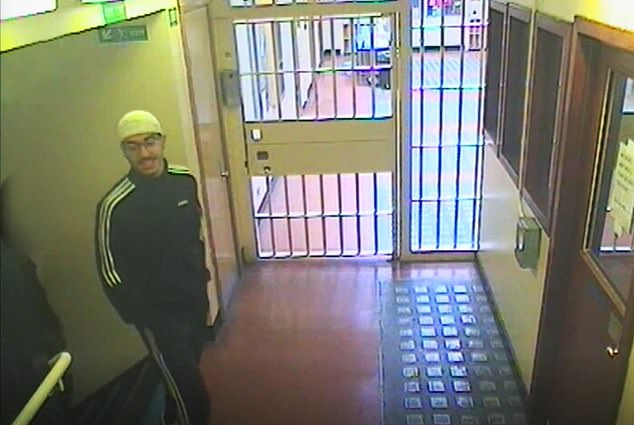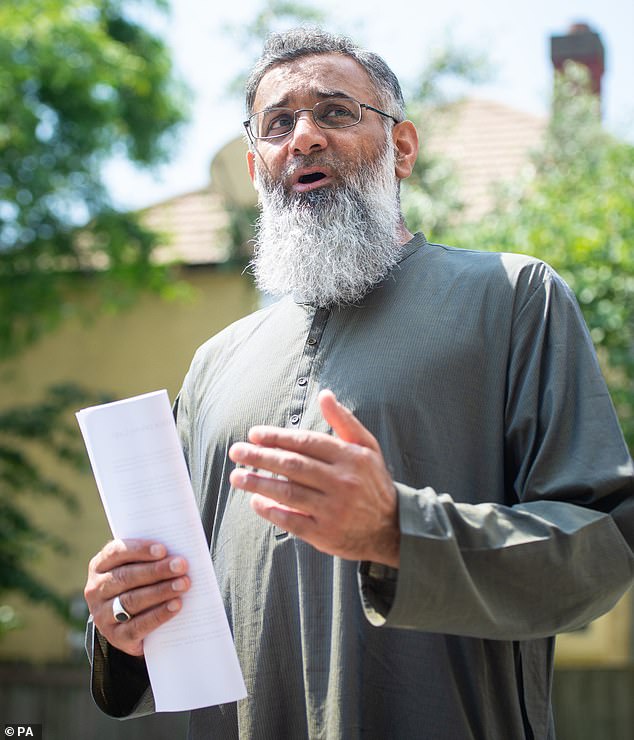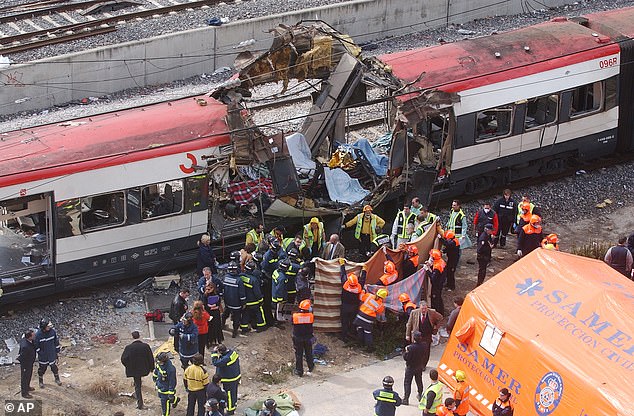Jailed terrorists are teaching their fellow prisoners to make bombs as part of a ‘skills exchange’ taking place inside British prisons, a report has warned.
Gang members are said to be sharing their own knowledge in return, from how to exploit the dark web and launder money to advice on obtaining weapons for use in attacks.
One detective warned that terrorists they had helped convict became more of a threat after serving their sentences due to connections they had formed behind bars.
It follows rising concern about the deteriorating security situation in British prisons amid a series of shocking attacks on staff.
One of the worst saw Manchester Arena bomb plotter Hashem Abedi, 28, attack three officers with improvised blades and hot cooking oil.
Islamist gangs run rampant in several high-security prisons, where they exploit the constant threat of violence to force non-Muslim inmates to join for ‘protection’.
While prisons have long been thought of as places where criminals hone their skills, the new report suggests interactions between ordinary offenders and terrorists is part of an emerging ‘crime-terror nexus’.
Drawing on interviews with inmates, prison officers and experts, the research suggests terrorists are picking up important new skills, such as illicit financing techniques to fund their operations.

CCTV showing Hashem Abedi smiling shortly before attacking an officer at HMP Belmarsh in 2022
On the other hand, organised criminals are learning how to make more deadly weapons.
Dr Hannah Bennett, author of ‘The Prison Crime-Terror Nexus’, said: ‘Some prisoners are coming out knowing how to make a bomb.
‘Others are learning how to use the dark web or commit financial crime. For many, it’s about protection – but it’s also about opportunity.’
One prisoner she spoke to described how, inside prison, he had learnt how to acquire and use ‘lethal missiles and mobile phone activated detonators’.
In her PhD thesis, Dr Bennett suggested that alliances between terrorists and organised criminals could continue outside prison walls.
She pointed out that the terrorists behind the 2004 Madrid bombings financed the atrocity by dealing drugs, while Al-Qaeda militants have been known to raise funds through credit card fraud.
The criminologist said the most fertile environment for conversations between terrorists and organised criminals were high-security prisons that had issues with corruption, violence and a lack of staff oversight.
‘Where you have violent, chaotic prisons with no consistent regime and inmates who are co-located without proper oversight, the risk is exponentially higher,’ she wrote.

Islamist gangs run rampant in several high-security prisons, influenced by radical preachers such as Anjem Choudhary
Responding to the study, shadow justice secretary Robert Jenrick said: ‘Extremists and career criminals now operate with near impunity inside some of this country’s highest-security prisons.
‘That is a complete failure of leadership – and a dangerous abdication of one of the state’s core duties: maintaining order behind bars.
‘When Islamist terrorists and organised crime figures are left to forge alliances, we aren’t just witnessing a security lapse – we’re watching a national threat incubate in plain sight. This cannot be allowed to continue.’
Dr Bennett’s report called for improved training to help prison officers reduce the ability of terrorists and organised criminals to work together.
She also warned of the threat of ‘Prison Islam’, which is defined by gang culture, loyalty, and selective interpretations of the Koran’.
One example it provided were the ‘Muslim Boys’ gang in HMP Belmarsh, which pressured other prisoners into following a ‘strict and extreme interpretation of Islam‘.
Hashem Abedi’s attack took place inside the separation unit at HMP Frankland in County Durham, which is only one of two in the UK and houses a small number of the most radical terrorists.
While they were intended to prevent the spread of Islamism, the rest of Frankland is now said to be so overrun by Muslim gangs that inmates who refuse to join them are now being housed inside its own unit for their protection.

The 2004 Madrid bombings killed more than 170 commuters
Tony Wyatt, a criminal defence barrister who regularly visits the jail, said some prisoners are being forced to serve their sentences in ‘total lockdown’ due to the breakdown in order.
Prison officials have been repeatedly criticised for allegedly tolerating Islamist gangs in the belief that their existence supports order.
In a 2022 report, Independent Reviewer of Terrorism Legislation Jonathan Hall KC said that prison authorities have a ‘tendency to view Islamist group behaviour’ as providing ‘a degree of calm and stability which means it is not necessarily perceived as a problem’.
He added that there was a ‘reluctance to focus on Islamist group behaviour’ and prison officers would sometimes appeal to the ‘wing emir’ to maintain order.
Ian Acheson, who called for the creation of separation units in a 2016 review of Islamic extremism in prison, believes jail bosses have been ‘appeasing’ these groups out of fear of being seen as racist.
During research for his report, he said officers at Frankland ‘spoke matter-of-factly about being taken hostage to be beheaded’.












